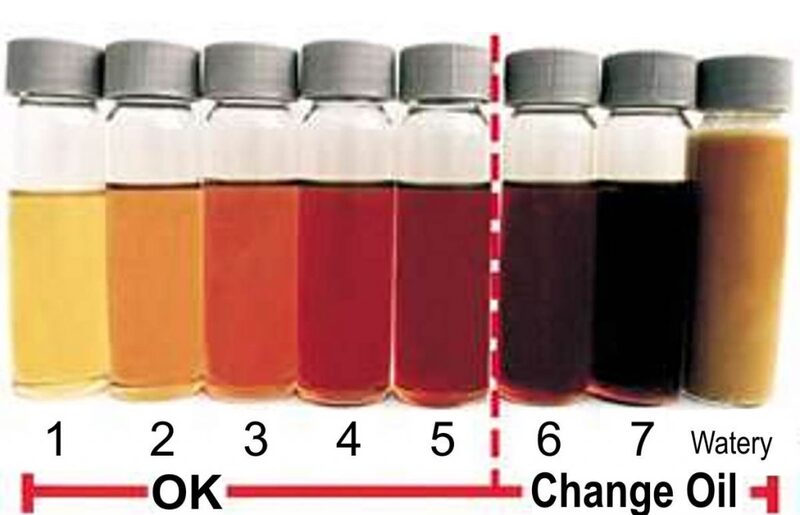Imagine standing by your car, ready for a road trip. You pop open the hood, check the fluids, and… your engine oil is a murky, almost black color. Suddenly, the thrill of adventure is replaced by a knot of anxiety. What does that color mean? Is your engine in trouble? These are questions that have plagued countless car owners, and the answer isn’t always straightforward.

Image: premiummaslo.ru
Engine oil is the lifeblood of your car. It lubricates moving parts, reducing friction and wear, and plays a vital role in cooling and cleaning. But like our own blood, its color can signal a lot about its health and performance. Understanding what a healthy oil color looks like and what deviations mean can save you from costly repairs and ensure a long, happy relationship with your vehicle.
A Colorful Guide: What Your Engine Oil Reveals
The most common colors you’ll find with engine oil are light amber, dark amber, brown, and black. While the exact color can vary depending on the type of oil and its age, there are general rules of thumb to keep in mind:
Fresh Engine Oil: The Golden Glow
New engine oil, straight from the bottle, typically has a light amber hue. It’s clean, full of additives, and ready to protect your engine. This color is what you’re aiming for when you change your oil.
Mildly Used: A Deepening Shade
As the oil circulates through your engine, it starts to pick up tiny particles of dirt, debris, and metal shavings. This gradually changes the oil’s color, darkening it to a darker amber or even a light brown. Don’t panic! This is perfectly normal, especially with oil that has seen a few hundred miles. It just means the oil is doing its job of trapping contaminants.

Image: www.machinerylubrication.com
Time for a Change: Approaching Darkness
When engine oil gets dark brown or nearly black, it’s a clear signal that it’s time for an oil change! The oil has become saturated with particles, and its ability to lubricate effectively is compromised. Continuing to drive with old, dark oil can cause increased wear on engine parts and lead to expensive repairs.
Beyond Dark: Potential Trouble
If you see milky or frothy oil, it could be a sign of a leak or a more serious problem like a blown head gasket. This is when you need to contact a mechanic immediately for a proper diagnosis.
Other Clues: Beyond Just the Color
While color is a good indicator, it’s not the only thing to consider. Pay attention to these other signs:
Smell: A Subtle Warning
Fresh engine oil has a faint, almost sweet smell. As it ages, the oil develops a stronger, more pungent odor. If the oil smells burnt or acrid, it indicates engine overheating or excessive wear, and you should seek professional attention.
Consistency: Feeling the Difference
Engine oil has a thick, viscous consistency. If you notice it becoming thin or watery, the oil may be degraded and no longer providing adequate lubrication. This could signify a leak or a problem with the engine.
The Bottom Line: What Color is Your Engine Oil?
Understanding what your engine oil color reveals about its health is crucial for proper car maintenance. Here’s a quick recap:
- Light Amber: Fresh, healthy oil.
- Dark Amber/Light Brown: Mildly used, still effective.
- Dark Brown/Black: Time for an oil change!
- Milky, Frothy, or Unusual Smell: Potential problems, seek professional help!
What Color Should My Engine Oil Be
Expert Advice: Keeping Your Engine Singing
Always consult your car’s owner’s manual for specific oil change recommendations. Generally, conventional oil should be changed every 3,000-5,000 miles, but synthetic oil can often go longer, up to 7,500 miles. However, frequent checks are always a good idea! If you’re unsure, consulting a mechanic is always the best course of action.
Maintaining your engine oil is a simple yet powerful way to extend the life of your car. By keeping a watchful eye on its color, smell, and consistency, you can identify potential problems early, ensuring many happy drives to come.






